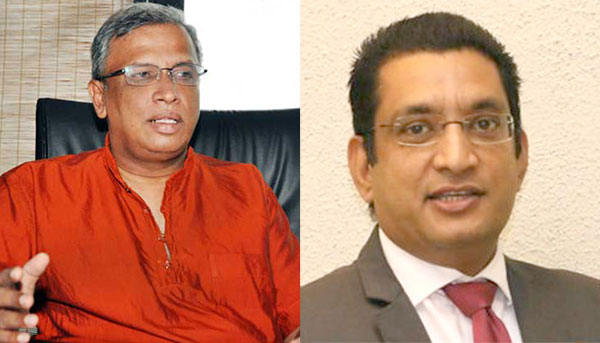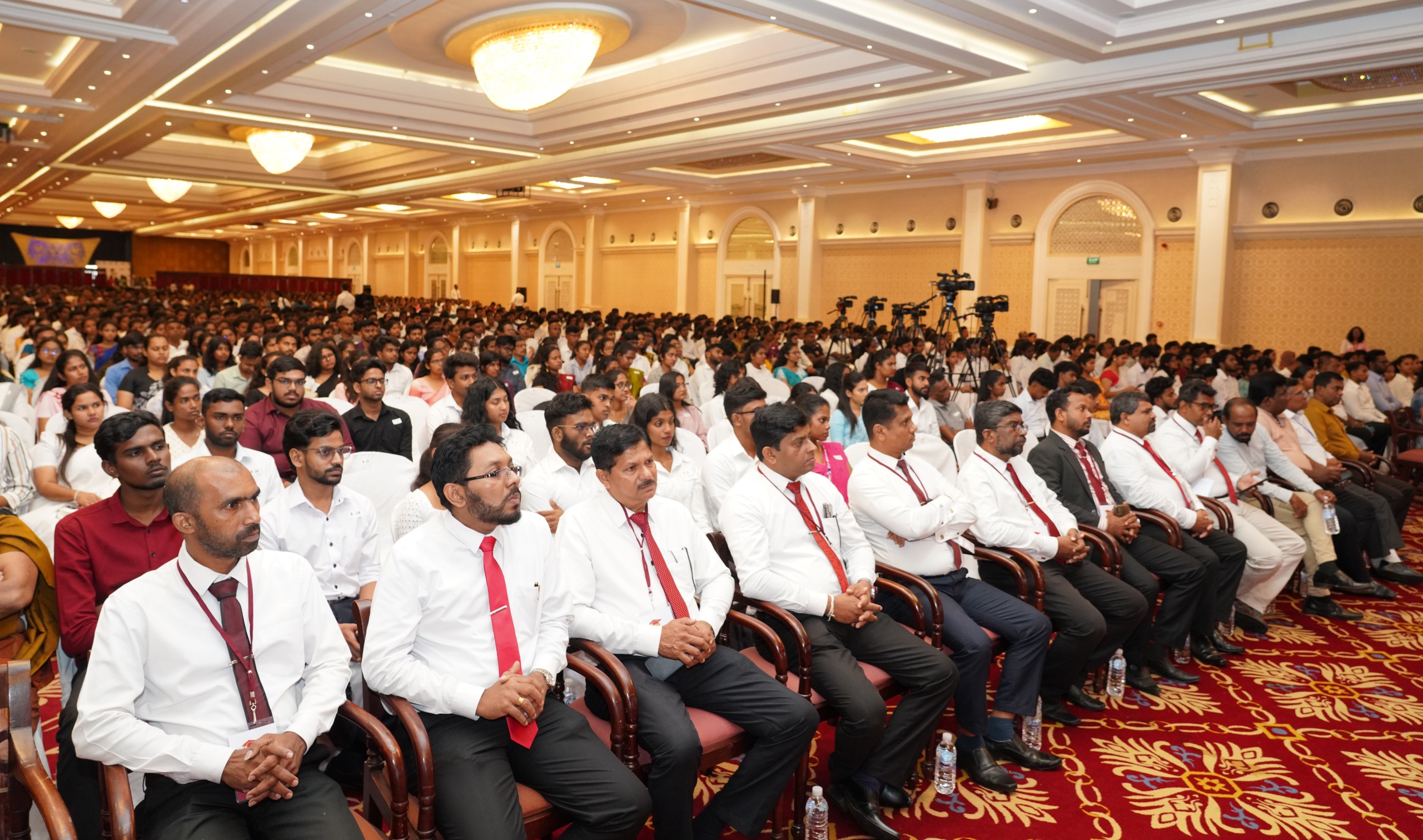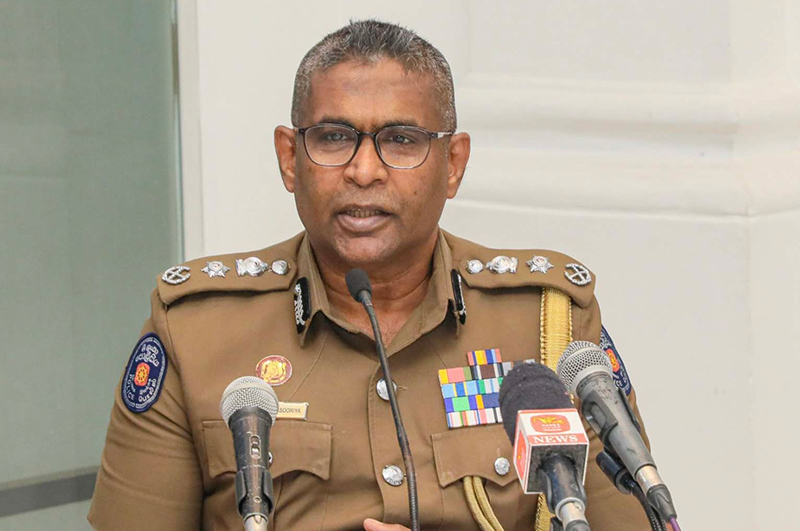News
Sumanthiran asks Ali Sabry to resign

By Saman Indrajith
TNA Jaffna District MP MA Sumanthiran yesterday called on Justice Minister Ali Sabry to resign from his post.
“I do not think you can sell your dignity and continue to hold the office of Justice Minister, merely telling the country or your community that you are trying to resign but you are unable to do so. It is a joke. It doesn’t do you any good. So, my plea to you, even in this august assembly I can address you my learned friend, is to stand up straight and resign immediately, if possible, before these sessions are over,” MP Sumanthiran said.
Participating in the third-reading-stage debate on Budget 2022 under the expenditure heads of the Ministry of Justice, MP Sumanthiran said the Minister of Justice was very uncomfortable in that post. “I reiterate what I said last year, that the Minister of Justice must be feeling as if he is the minister of ports and shipping of Afghanistan. We saw in the media that the Minister of Justice said that he is trying to resign. It is very strange when a person tries to resign and is unable to resign. A member of the legal profession, he should know how to resign. What is there trying to resign and not being able to resign? That is what we read in the media. The Minister of Justice does not know how to resign. It is very strange. All these point to the fact that the Minister of Justice is uncomfortable to hold that post in the current regime. I do not blame him for that.
“The government, for all its rhetoric, has unashamedly interfered in the process of administration of justice in this country. I read the news that former Navy Commander Wasantha Karannagoda is tipped to succeed former Governor Raja Kollure, who passed away recently. Wasantha Karannagoda is an accused, a suspect in one of the emblematic cases in this country. The case is about the abduction of eleven youth for ransom by naval personnel in Colombo. They were taken to Trincomalee Naval Base and killed. Now, the police, having conducted their investigations, have named several suspects including the Navy Commander at the time.
“Inexplicably, the Attorney General is in a mighty hurry, an indecent hurry, trying to withdraw indictments or has indicated that he would withdraw indictments against Wasantha Karannagoda. The families of these young men have been agitating for justice for so long. It is such a person the government wants to appoint as a governor.
“Not only that, but also many indictments filed during the time of the last government by the then Attorney General, for incidentally who is the Chief Justice today, are being withdrawn by the current Attorney General. As soon as he was appointed to that post, the first thing he did was withdrawing indictments filed against the members of the current government.
“The Attorney General is supposed to be independent in our country. The appointment is supposed to be independent and during his tenure he is supposed to be independent. Unlike in many other countries, we have our own traditions which stipulates that the Attorney General is an independent appointee. Even in Great Britain and India the Attorney General is a political appointee. Yet, in those countries even the attorney generals are political appointees and we find them act independently after their appointments. Here its reverse seems to be true.
“The Minister protested against the appointment of another convict who was pardoned. He was convicted for contempt of court where he was sentenced following a complaint made by a magistrate for disturbing the proceedings in a court. The learned Magistrate complained to the Court of Appeal and after a full-blown inquiry where the venerable monk was afforded a hearing, he was conducted and sentenced. And then he was pardoned. He has another case currently pending before the Court of Appeal where he violated the order in the Magistrate’s Court in Mullaitivu and facilitated the cremation of the body of another monk in the premises of a Hindu temple. Such a person the government finds suitable enough to be appointed to the post of Chairman in a task force. Naturally, the minister protested, also for the reason I suppose he was not consulted. Originally, no Tamil was appointed to this task force, which was a good thing. I do not think any self-respecting Tamil would have served in this task force. But as it often happens, we find every kind of person in any community. And so, the government found three persons who buried their dignity and went and sat in this task force. I say this because this task force is captioned as one country one law. Most people think that this has to do something with personal laws. It is far worse than that.
“The government says it is committed to devolution of powers. It has been saying so to the international community. Prime Minister Mahinda Rajapaksa when he was the president assured India repeatedly in three joint statements and in another joint statement with the Secretary General of the United Nations, he made a promise to enhance devolution. If that is the case, then there can’t be one country with one law.
“Even in this broken system under the 13th Amendment to the Constitution and this provincial council system which we do not accept, there is legislative power over certain subjects that are devolved to the provinces. The provinces can make their own laws in respect of matters in the provincial council list and even on the matters that come under the concurrent list. We have been saying that the matters that have been devolved to the provinces must be exclusively devolved to the provinces and the provinces must be supreme in respect of those issues. The legislative power that has been given to them must be supreme. The Center ought not to override those powers. But that is not the case, the Center with two thirds majority can override it as we saw in the Divi Neguma case and various other instances. Nevertheless, in our constitution we have legislative powers devolved to the provinces. And the government has promised to devolve more powers to the provinces. While that is the case on one hand, the government has appointed a task force to ensure one country one law. It runs contrary to the current constitutional arrangement and contrary to the various promises you are dishing out to the world that you would enhance devolution. That is why I said that any self-respecting Tamil would serve in that one country-one law task force. For various reasons people would go and sell their dignity. Some Muslims too have been appointed to the task force.
“At the original appointment, no Tamil was appointed to that task force. We were elated that no Tamil has been appointed to that task force. Later some people added – that is afterthoughts. Does it mean that Tamils are afterthoughts of this country? We have been living in this country longer than many other communities. This country belongs to us as it belongs to anybody else. We are not afterthoughts of this country.
“This task force we reject; in fact we do not have to say so because of the caliber of the person who had been appointed to chair it. We do not think you can continue to sell our dignity and serve in this office,” MP Sumanthiran said tod the Justice Minister.
Latest News
In order to safeguard the future of the country, a quality human resource must be developed. – Prime Minister

Prime Minister Dr. Harini Amarasuriya stated that in order to ensure the economic, social, and cultural security of the country, it is essential to develop a quality human resource, and that education plays a vital role in achieving this goal.
The Prime Minister emphasized that the government is committed to bring about a transformation in the education sector, and that the government will continue to move forward by overcoming obstacles encountered along the way, guided by a clear vision and purpose.
The Prime Minister made these remarks while addressing the EDCS Sisu Nena Pranama scholarship award ceremony held on Saturday (31) at Temple Trees, organized to recognize the children of the members of the Education Co-operative Society (EDCS) who have been selected to state universities for the academic year2023/2024.
Elaborating further, the Prime Minister noted that this program, organized by the Education Service Employees– Co-operative Thrift and Credit Society Ltd, is not merely about providing scholarships, but is an occasion that recognizes and appreciates the dedication of students and their parents who are preparing to shoulder the responsibility of the country’s future.
The Prime Minister also pointed out that it is a remarkable achievement that a society which began in 1930 with just 58 members and a membership fee of one rupee has today grown into the largest cooperative society in South Asia, with approximately 215,000 members.
The Prime Minister further highlighted how rapidly the world is changing, and the increasing necessity of developing human resources in the face of economic and environmental crises. She stressed that the education system must be transformed from the level of school education itself to align with the demands of the modern world, and that students entering universities should become leaders and active participants in this transformation.
Noting that out of nearly 300,000 students who enter primary education each year, only about 40,000 gain admission to universities, the Prime Minister urged students to make use of this opportunity for the development of the country.
Addressing the occasion, Deputy Minister of Labour and General Secretary of Ceylon Teachers Service Union, Mahinda Jayasinghe, stated that due to corruption-free management, it was possible to increase the financial stability of the society from Rs. 1,200 million to Rs. 1,700 million within a short period of approximately nine months.
Under this year’s program, scholarships amount to over Rs. 13.7 million were awarded to 2,292 students who have been selected to state universities.
This scholarship program, which initiated in 1984 with 15 students and an initial fund of Rs. 3,500, has been conducted continuously for 41 years. At present, scholarships of up to a maximum of Rs. 75,000 per student are awarded, demonstrating the collective strength and solidarity of the teaching community.
The event was attended by the Chairman of the Education Development Cooperative Society, Lal Kumara, the Western Province Director of Education, Darshani Iddamalgoda, along with other officials.

[Prime Minister’s Media Division]
News
Police face 32,000-officer shortage:IGP

IGP Priyantha Weerasooriya says that the Police is facing a shortage of nearly 32,000 personnel and is currently operating well below its required strength.
He made these remarks while attending a ceremony held on Friday morning (30) to recognise the contribution of fingerprint officers, crime analysis officers and forensic photographers attached to the Criminal Investigation Department for their role in solving crimes.
Addressing the gathering, the IGP said that around 2,500 police officers are due to retire this year, with a further 2,700 officers expected to retire next year.
In view of the growing cadre shortfall, he said plans are underway to recruit 10,000 new officers to the Sri Lanka Police in the future.
News
Lanka’s Sabina Yousaf wins Mrs. Photogenic, Second Runner-Up at Mrs. World

Sri Lanka earned international recognition at the 41st Mrs. World pageant, with Sabina Yousaf being named Second Runner-Up, marking a notable achievement for the country at the prestigious global competition.
In addition to securing a top-three finish, Yousaf also won the Mrs. Photogenic mini-title and placed among the Top 20 contestants, underscoring her strong performance on the international stage.
The Mrs. World 2025 crown was won by Chanita Seedaket Craythorne of Thailand, while Paige Ewing of the United States was declared First Runner-Up.
The grand finale was held on 29 January in Las Vegas, Nevada, and featured contestants from more than 60 countries competing for the coveted title.
The announcement of the Top Three finalists placed Sri Lanka alongside leading global pageant contenders, reinforcing the country’s growing presence in international pageantry.
Final Results – Mrs. World 2025:
Winner: Thailand – Chanita Seedaket Craythorne
First Runner-Up: United States – Paige Ewing
Second Runner-Up: Sri Lanka – Sabina Yousaf
-

 Business6 days ago
Business6 days agoComBank, UnionPay launch SplendorPlus Card for travelers to China
-

 Business3 days ago
Business3 days agoClimate risks, poverty, and recovery financing in focus at CEPA policy panel
-

 Opinion2 days ago
Opinion2 days agoSri Lanka, the Stars,and statesmen
-

 Business1 day ago
Business1 day agoHayleys Mobility ushering in a new era of premium sustainable mobility
-

 Opinion6 days ago
Opinion6 days agoLuck knocks at your door every day
-

 Business1 day ago
Business1 day agoAdvice Lab unveils new 13,000+ sqft office, marking major expansion in financial services BPO to Australia
-

 Business1 day ago
Business1 day agoArpico NextGen Mattress gains recognition for innovation
-

 Editorial1 day ago
Editorial1 day agoGovt. provoking TUs













